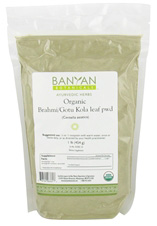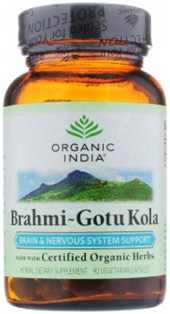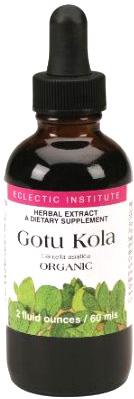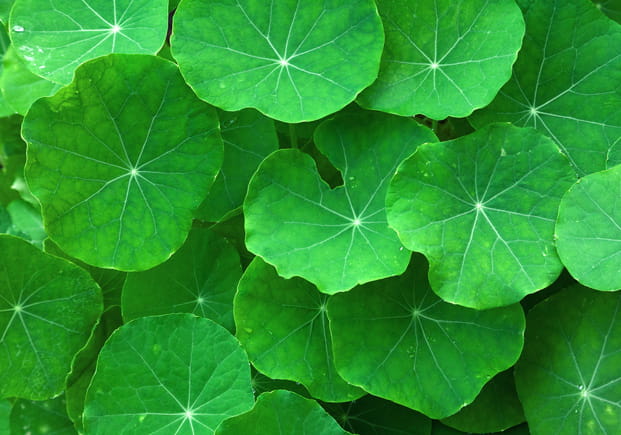
Gotu Kola:
The Many Benefits of the Ancient Herb of Enlightenment and Longevity
In nature, form follows function. It should come as no surprise then, that one of Ayurvedic and Chinese medicine’s most treasured herbal medicines, Gotu Kola (Sanskrit: Brahmi, Latin: Centella asiatica), is highly reminiscent of the shape of the human brain. After all, it has been revered for thousands of years for its ability to enhance cognitive
function. But Gotu Kola’s impressive list of benefits go much further than that—in every sense, this herb is a veritable panacea of healing; a true adaptogen (a term used to describe herbs that have a balancing and harmonizing effect on the mind, body and spirit). For this reason, it was highly prized in both ancient India and China, with references to the plant showing up in classical Ayurvedic and Daoist medical texts.
1. Improved Brain Function & Longevity
In both countries and across Asia on the whole, Gotu Kola was known as a longevity herb. The Daoist master and herbalist Li Ching-Yuen was, in his time, a famous proponent and user of the plant. Ancient Chinese medical texts report that he died at the ripe age of 256 years old and attribute his longevity in large part to the use of Gotu Kola on a daily basis. While the accuracy of these records is up for debate, the fact is that Gotu Kola is a well studied herb, and the vast majority of its healing and therapeutic properties, including its ability to measurably prolong life, have been documented and validated by the scientific community.It’s life-extending properties are most likely due to a synergistic combination of its powerful effects on the mind, body and spirit—in every sense, the whole person. The plant’s benefits range from greatly improving memory and restoring brain cell and nerve function to improving blood quality and circulation, restoring digestion and speeding the healingof wounds.
2. Increased Intelligence & Cognitive Functioning
Of particular interest in our fast-paced, intellectually demanding modern world is Gotu Kola’s ability to enhance nearly every aspect of mental functioning. Typically herbs or substances that can achieve such feats are highly stimulating; however, Gotu Kola is centering, which makes it ideal for anyone looking for a cognitive boost without any of the unwanted and imbalancing side effects of stimulants. In one study, children who took a half a gram of Gotu Kola extract powder every day for one year demonstrated significant improvement of their intellectual level. After six months, there was a substantial improvement in intelligence, cognitive function and concentration.
3. Rebuilds the Nervous System & Reduces Anxiety and Stress
In Ayurvedic medicine, the effects of Gotu Kola classify it as a rasayana, or rejuvenative herb, due to its ability to restore functioning, balance and health to many parts of the mind and body. For example, it is an extremely healing herb for the nervous system and has been shown to repair and restore axons , which are used to transmit nerve impulses throughout the brain and body. As such, it has been used as an anti-anxiety, anti-stress and anti-insomnia medicine throughout its long history of human use.
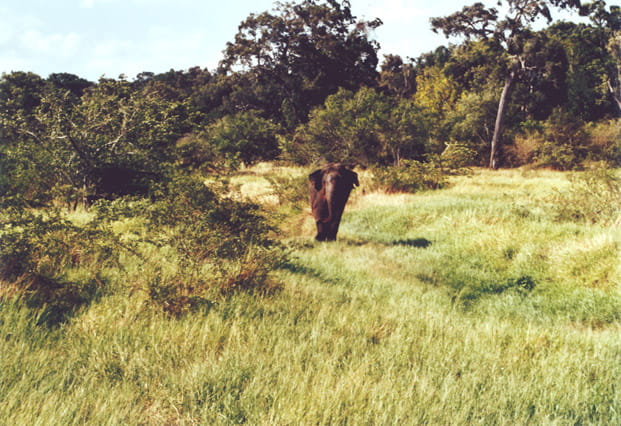
Legend has it that Sri Lankan’s observed Elephants eating wild growing Gotu Kola and decided to try it themselves, then discovering the plant’s medicinal properties. photo: schmodder photocase.com
The ability of Gotu Kola to improve blood quality and circulation is likely one of the main components of its rejuvenative effects, as our blood comes into contact with and nourishes nearly every single area of our mind and body, supplying oxygen and other essential nutrients.
4. Psycho-Spiritual Effects: The Herb of Enlightenment
Gotu Kola has long been a favorite herb of Daoists, monks, yogis and sages due to its unique cerebral effects. Many Ayurvedic texts reference the herb’s spiritually enhancing properties, poetically referring to it as the ‘Herb of Enlightenment’. Meditators in particular have sought the plant out for its ability to harmonize the right and left brain hemispheres, which produces a heightened state of awareness, commonly seen in people demonstrating what Mihaly Csikszentmihalyi has popularized as flow states—states where one becomes intensely absorbed with the activity at hand, in which learning and brain circuitry are significantly enhanced.
Gotu Kola grows widely throughout Central Asia and parts of Africa and is native to China, India, Indonesia, Japan, South Africa, Sri Lanka, and various islands in the South Pacific. It’s a small green plant similar on a genetic level to carrots that thrives in wet areas and is used in much the same way as one might use cilantro or parsley in the West. Many health conscious locals add Gotu Kola leaves to salads for their positive effects as the plant is a general life-enhancing tonic and preventative. So the story goes, Sri Lankans noticed elephants regularly eating leaves of the plant, and after trying it themselves, discovered the quite noticeable and profound effects it had on memory and lifespan, which gives credence to the fact that the elephant has been mythologically associated with these qualities throughout human history.
Choosing a Quality Supplement
Due to Gotu Kola’s long history of safe use and the massive amount of research supporting its sizeable list of health benefits, the herb is grown widely and is readily available in most locations worldwide. However, as with any herbal supplement, quality, freshness and potency are of utmost importance. With much of the world’s supply originating in Asia, it is important to look for the standard markers of herb quality, such as the organic or wildcrafted label and to only purchase products from reputable suppliers. Indian organic Gotu Kola supplements are usually of good to excellent quality with the wild-growing Himalayan varieties being rare and highly sought after.
If you are purchasing tablets or capsules be sure to look for brands with minimal additives and fillers, although this is less of a concern when purchasing powdered herb. Gotu Kola has a very mild to slightly bitter taste, meaning it can be consumed as a tea or simply in a glass of water enjoyably. The traditional Ayurvedic method of preparation is to mix Gotu Kola powder with a teaspoon or so of ghee (clarified, medicinal butter). Ghee has a penetrating effect and helps the herb move deeper into bodily tissues. Ghee also enhances the digestive healing properties of the herb and for those sensitive to taste, may make it more palatable.
Dosage
As with any new herbal product it is recommended to start off slowly and work up to higher dosages as you become familiar with its effects on your mind and body. Gotu Kola supplements are safe to take long term, but many Ayurvedic practitioners recommend taking a few days to a week break in between periods of extended use, ranging from two to four weeks at a time.
Although not quite as widely known in the West as more popular herbs like Echinacea and Ginseng, Gotu Kola is one of the planet’s true medicinal treasures and is well worth investigating for anyone looking to fine tune their health.
Recommended Gotu Kola Products
Organic Gotu Kola Powder
Banyan Botanicals
Banyan Botanicals offers high-quality, fair trade, organic Gotu Kola supplement grown and harvested sustainably in India. This is a versatile bulk powder ideal for getting the greatest medicinal, brain and health boosting effects from the plant. It has a very mild taste and can be added to water, smoothies, teas or ghee.
click here to learn more
Organic Gotu Kola Capsules
Organic India
Organic India offers a whole plant extract, wild harvested in remote spring-fed forests in India. They offer Gotu Kola in a convenient vegan/vegetarian capsule form for those on the go or who dislike the taste of herbs, but still wish to experience the benefits.
click here to learn more
Organic Gotu Kola Tincture
Eclectic Institute
Eclectic Institute offers a liquid extract of organic Gotu Kola leaf in a base of organic grape alcohol, which is has been used for thousands of years as an ideal medium for extracting the active medicinal compounds in herbs and driving them deep into body and brain tissue for maximum medicinal effects.
click here to learn more
Organic Brahmi Oil
Banyan Botanicals
Banyan Botanicals’ certified organic Brahmi oil is made of sesame oil infused with a decoction of Brahmi (the Sanskrit name for Gotu Kola) and Bacopa (Bacopa monniera). The healing qualities of these remarkable herbs combine with the soothing properties of the oil for deeply rejuvenating and balancing effects.
click here to learn more
Guidelines For Safe and Effective Use
If you are using the bulk powder, it is quite easy to make a tasty gotu kola tea from the herb, which, when mixed with honey or simply straight up by itself in water makes an excellent medicinal drink to sip throughout the day.
If you are using capsules or tinctures you can simply take them with food at your convenience. It is recommended to try them for the first time in the morning as some people might find them slightly stimulating and energizing. However, others might find it more relaxing. The plant is a mild adaptogen so it tends to give you more of what you need.
The brahmi gotu kola oil can be applied to any non-sensitive area of your body for a soothing, restorative and rejuvenating effect. Many men and women in India and Asia use the oil for calming, healing and anti-aging effects.
Recommended dosages start at 1/2 gram daily up to 4 grams per day. It is always wise to start slow and work your way up to determine the optimal dose for your body.
Side Effects and Interactions
Overall, the herb is remarkably safe and has been used without serious side effects for thousands of years. However, some people report that at higher dosages of the plant, they have noticed mild headaches, dizziness and drowsiness. Like any medicinal plant, more is not always better and often lower dosages have just as much, if not more benefit.
There are few precautions and interactions with gotu kola to be worried about, however, if you are concerned about potential interactions with pharmaceutical medications, consult your doctor or naturopath for further guidance.


